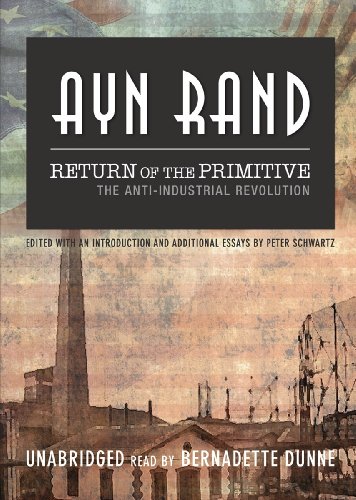
Return of the Primitive
The Anti-Industrial Revolution
by Ayn RandIn the 1960s and early '70s, the most prominent, vocal cultural movement was the New Left: a movement that condemned America and everything it stood for: individualism, material wealth, science, technology, capitalism.
While the New Left achiev.
- First published
- Feb 01, 2011
- Publishers
- Blackstone Publishing·Blackstone Audio· Inc.
Like all of her nonfiction, this has a powerful, unique interpretation of modern events (modern when this was written). Very thorough looks at each issue.
About Ayn Rand
Alisa Rosenbaum was born in pre-revolutionary St. Petersburg to a prosperous Jewish family. When the Bolsheviks requisitioned the pharmacy owned by her father, Fronz, the Rosenbaums fled to the Crimea. Alisa returned to the city (renamed Leningrad) to attend the university, but in 1926 relatives who had already settled in America offered her the chance of joining them there. With money from the sale of her mother's jewelry, Alisa bought a ticket to New York. On arrival at Ellis Island, she changed into Ayn (after a name of some Finnish author, probably "Aino") Rand (which she said was an abbreviation of her Russian surname). She moved swiftly to Hollywood, where she learned English, worked in the RKO wardrobe department and as an extra, and wrote through the night on screenplays and novels. She also married a bit-part actor called Frank O'Connor because he was 'beautiful' - and because her original visitor's visa had run out.Rand sold her first screenplay in 1932, but nobody would buy her first novel We the Living (1936) a melodrama set in Russia. Her first real success was The Fountainhead (rejected by more than ten publishers before publication in 1943).She started a new philosophy known as Objectivism, opposed to state interference of all kinds, and her follow-up novel Atlas Shrugged (1957) describes a group who attempt to escape America's conspiracy of mediocrity. Objectivism has been an influence on various other movements such as Libertarianism, and Rand's vocal support for Laissez-faire Capitalism and the free market has earned her a distinct spot among American philosophers, and philosophers in general.---...
Books

Anthem
ayn ayn rand

Payback Is Hell
Wes Rand

2022 Road Atlas With Protective Vinyl Cover
Rand McNally

Comrade Lawyer
Robert Rand

Know GeographyTM World Atlas Grades 1-3
Rand McNally
With the same colorful and engaging content from rand mcnally's award-winning junior classroom atlas, know geography?

Easy To Read
Rand McNally

Paul Rand
Paul Rand
If paul rand was the most influential american graphic designer of the twentieth century, then paul rand: a designer's art is the most important on his work.

Teaching Photography
Glenn Rand
The photographic community is rife with talented and creative practitioners and artists.

Anthem
Ayn Rand
Anthem has long been hailed as one of ayn rand's classic novels, and a clear predecessor to her later masterpieces, the fountainhead and atlas shrugged.

The head that wouldn't die
Rand Higbee

Dark Sea
E. J. Rand

Ohio State
Rand McNally

Carl Runk's Coaching Lacrosse
Rand Pecknold

Goode's World Atlas
Rand McNally Staff
goode s world atlas has been the world s premiere educational atlas since 1923, and for good reason.

Sams Teach Yourself Microsoft Expression Web 2 in 24 Hours
Morten Rand-Hendriksen

Reservations
Lisa Rand

Law and the American health care system
Rand E. Rosenblatt

Neo-Nazis and German Unification
Rand Lewis
This book traces the activity of the neo-nazis in germany from the fall of the berlin wall in 1989 to the present.

So small
Ann Rand

Modern accounting, its principles and some of its problems
Henry Rand Hatfield
Many of the earliest books, particularly those dating back to the 1900s and before, are now extremely scarce and increasingly expensive.

At Minas Basin, and other poems
Theodore H. Rand

The rhododendron and "American plants."
Edward Sprague Rand
Similar books

Laurel's glass world
Laurel Nelson

ComTrain basic tower technology
Winton W. Wilcox

DRAGON'S GAP
L. M. Lacee

L'Europa multiculturale
Convegno internazionale di studi italo-tedeschi (24th 1998 Merano, Italy)

Four days in June
Iain Gale

Clay modeling
Sally Henry

¿SE PUEDE TERMINAR CON LA PRISIÓN?. CRÍTICAS Y ALTERNATIVAS AL SISTEMA DE JUSTICIA PENAL
Paz Francés Lecumberri

Dare
Bradley Charbonneau

Imperialism and Capitalism, Volume I
Dipak Basu

Sur les radiants des Andromédides
F. A. Bredikhin

Old Turtle
Douglas Wood

Pertinente beschrijvinge van Guiana
Simon van Beaumont

History of a pin, as related by itself
Smythies Miss

Letter of the Hon. Dudley Marvin, of New York
Dudley Marvin

Politicus sceleratus impugnatus
Christoph Peller von und zu Schoppershof

Smoking and drinking
James Parton
The next very important thing that man has to attend to is his health.

Paraxylenedisulphonic acid
Jesse Herman Holmes
This work has been selected by scholars as being culturally important, and is part of the knowledge base of civilization as we know it.

Versuch eines kriegs-rechts der Negern in Afrika und Indianer in Amerika
Johann Gottlieb Franz Koch

The law of domestic relations in the state of New York
Fletcher W. Battershall

Bear in town
A. H. Benjamin

Ange Pitou, agent royaliste et chanteur des rues (1767-1846)
Engerand, Fernand

Das buch von den kleinen
Peter Rosegger

Histoires à faire pâlir la nuit
Alfred Hitchcock

Oxford study mathematics dictionary
Frank Tapson

Stolen land, stolen lies and the great con trick of debt!
Shirley-Anne Hardy

The Blackbirder
Dorothy B. Hughes
A classic world war ii-era noir with a page-turning plot, a cast of colorfully sinister characters and a protagonist who is thrust into the heart of political intrigue, this captivating 1943 novel parallels the spy novels of grahame greene, eric ambler.

Oedipe, Narcisse, Sisyphe et vous
Pierre Varrod

Dans la cuisine de sœur Angèle
Angèle soeur

The law of evidence
Geoffrey Gilbert
this work has been selected by scholars as being culturally important, and is part of the knowledge base of civilization as we know it.

Statistics of the colored people of Philadelphia
Pennsylvania Society for Promoting the Abolition of Slavery. Board of Education

Derecho de daños
Carlos Alberto Ghersi

Sanseidō nenjū gyōji jiten
Senʼichi Tanaka

Classic football debates settled once and for all
Danny Baker
At long last, the award-winning baker & kelly bring you the most entertaining, radical, and unreliable football book ever published.

Sozoekonomiczny model realizacji procesów cyklu obiektu budowlanego
Andrzej Więckowski

Iseseisvuspäev
Kaur Kender

Budem pomnitʹ ėti peregony--
A. N. Manzhosov

Capee apeye queti marĩ pũnaa na cabueppe
Ronald G. Metzger

Muqābasāt nihāyat al-qarn
ʻUthmān ʻUmayr

Vospominanii︠a︡ o budushchem
Ruslan Azimov

Nihonkoku Kenpō
Shigenori Matsui

Iedereen doet aan psychologie
Maarten Derksen

Os Maias e o desenvolvimento sociomoral dos alunos
Carlos Alberto de Sá e. Silva

Microdósis de plantas medicinales de Chiapas y región tropical
Eugenio Martínez Bravo

Zu ling de jiao bu
Jianci Zeng

L'expropriation des droits de voisinage
Grégory Bovey

Joulupukin aapinen
Sinikka Salokorpi

Lichnostno-orientirovannyĭ obrazovatelʹnyĭ prot︠s︡ess
Munit︠s︡ipalʹnyĭ nauchno-metodicheskiĭ t︠s︡entr obrazovanii︠a︡ g. Penzy

O céu da memória
Fernando Catroga

Entwicklung von potentialorientierten Produktionsstrategien
Bernhard Ludwig Lenz

Determinants of cognitive decline in the oldest old
Jacobijn Gussekloo

HL Böhme
Hans-Ludwig Böhme

Sept ans Fonds SATW-Branco Weiss
Jean-Claude Badoux




![Curtis Sittenfeld-The Man of My Dreams [First Edition]](https://media.celebri.com/books/85/9780330441285.jpg)
